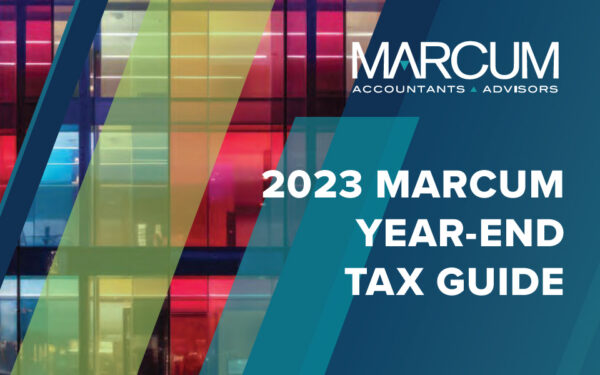Courts Challenge IRS in 2023: What Could This Mean for Taxpayers in 2024?
By David Shuster, Partner, Tax & Business Services
Amid a shifting tax landscape, 2023 proved to be a landmark year for taxpayers as federal courts handed down significant rulings in their favor, challenging the IRS’s stance on various issues. The judiciary set new precedents, from limiting penalties for Foreign Bank Account Reports to refining the process of challenging deficiency notices. Yet, the implications of these decisions raise questions on their broader applicability and the future direction of tax litigation.
During 2023, federal courts issued the following significant decisions favorable to taxpayers in their controversies with the IRS:
- In February, the US Supreme Court in Bittner v. United States held that the non-willful Foreign Bank Account Report (FBAR) penalty is limited to $10,000 per year. The government had argued $10,000 per account per year. (The $10,000 is adjusted annually for inflation and is currently $15,611.)
- In April, the US Tax Court in Farhy v. Commissioner of Internal Revenue held that the IRS could not use its vast administrative enforcement powers to collect certain penalties. Instead, the IRS must have the US Justice Department sue to recover such penalties.
- In July, the US Third Circuit Court of Appeal in Culp v. Commissioner of Internal Revenue held that the time limit for filing a petition in the US Tax Court for challenging a deficiency notice is not jurisdictional, meaning that, instead of dismissing a late petition merely because it’s late, the Tax Court may consider such petition if the taxpayer can establish equitable tolling. More plainly, the Tax Court has the discretion to extend the deadline if the taxpayer can give a sufficient reason for missing the deadline.
As these rulings currently stand (the decision in Bittner is final, the government has appealed the decision in Farhy, and, as of this writing, the government has not (yet) sought a Supreme Court review of the decision in Culp), they are favorable to the taxpayers litigating them. But are they necessarily advantageous to other taxpayers?
For example, after Bittner, will the IRS seek to impose the more onerous willful FBAR penalty in cases where it previously might have settled on imposing a non-willful penalty? The relevant statute authorizes a penalty equal to the greater of $100,000 (approximately $156,000, adjusted for inflation) or 50% of the account balance for willful FBAR violations.
Does Farhy mean that the IRS is now necessarily required to refund certain penalties it collected administratively (through levies, for example) that the IRS was not, under Farhy, entitled to collect administratively? The government is likely to argue, under well settled precedent, that it is entitled to keep amounts it has already collected where the merits of its claim are not in dispute. In other words, if the penalty is valid, a taxpayer might not be entitled to a refund merely because the government wrongfully collected it administratively. Taxpayers might have to argue the merits of their penalties if they wish to see refunds.
Lastly, taxpayers who can rely on Culp and missed the petition filing deadline must carefully consider how to proceed. One advantage of litigating in Tax Court is that a taxpayer may challenge an asserted deficiency without paying it first. By contrast, if the taxpayer wishes to challenge a deficiency determination in a federal district court or the US Court of Federal Claims, the taxpayer must first pay the asserted deficiency and sue for a refund. Those failing to establish equitable tolling in Tax Court will have their cases dismissed and be required to pay the asserted deficiencies, but they will be barred from suing for refunds. Should they, therefore, risk trying to establish equitable tolling in Tax Court merely so they can challenge the deficiencies asserted against them without having to pay them first? Or, keeping in mind that failing to establish equitable tolling would bar them from having their day in any court, should they forego Tax Court altogether, pay the deficiencies, and challenge them in federal refund suits?
Nevertheless, do the decisions in these cases signal a trend that courts are, ostensibly, becoming more taxpayer friendly? If so, what does that mean for the taxpayers in Moore v. United States, a 2022 case decided by the US Ninth Circuit Court of Appeal in favor of the government but one that the Supreme Court in 2023 agreed to review? Moore is not a tax controversy case in the sense of Bittner, Farhy, or Culp, but the stakes are potentially high. The issue in Moore involves the Internal Revenue Code’s so called transition tax, which affects certain shareholders in certain foreign corporations. Some believe that a favorable decision for the taxpayers in that case could upend other taxing regimes, such as those that apply to partnerships, S corporations, and dealers in securities and commodities. Yet others believe that a taxpayer favorable decision could pre empt the government’s ability to impose a wealth tax.
As with Bittner, Farhy, and Culp, a favorable decision for the taxpayers in Moore, depending on what the Supreme Court says in that case, might not necessarily be advantageous for other taxpayers or even for the taxpayers in Moore. For example, if the Court strikes down the transition tax, the income otherwise subject to that tax could eventually be taxed at a rate greater than the transition tax rate. Further, the viability of tax cuts enacted by the TCJA in 2017 and paid for in part by the transition tax could be cast into doubt because eliminating one piece of TCJA (the transition tax) raises questions of whether the TCJA must be struck down entirely.





















